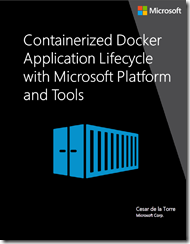Free ebook: Containerized Docker Application Lifecycle with Microsoft Platform and Tools
 We have a new free ebook to share! This ebook, Containerized Docker Application Lifecycle with Microsoft Platform and Tools, by Cesar de la Torre, was published by the Microsoft DevDiv team. Cesar has previously written for Microsoft Press, so we’re helping spread the word about his new ebook. Enjoy!
We have a new free ebook to share! This ebook, Containerized Docker Application Lifecycle with Microsoft Platform and Tools, by Cesar de la Torre, was published by the Microsoft DevDiv team. Cesar has previously written for Microsoft Press, so we’re helping spread the word about his new ebook. Enjoy!
Contents at a glance
Section 1: Summary
Section 2: Introduction to containers and Docker
Section 3: Introduction to the Docker application lifecycle
Section 4: Introduction to the Microsoft platform and tools for containerized applications
Section 5: Architecting and developing containerized applications with Docker and Azure
Section 6: Docker application DevOps workflow with Microsoft tools
Section 7: Running, managing and monitoring Docker production environments
Section 8: Conclusions
Summary
Enterprises are increasingly adopting containers. The enterprise is realizing the benefits of cost savings, solution to deployment problems, and DevOps and production operations improvements that containers provide. Over the last years, Microsoft has been rapidly releasing container innovations to the Windows and Linux ecosystems – partnering with industry leaders like Docker and Mesosphere to deliver container solutions that help companies build and deploy applications at cloud speed and scale, whatever their choice of platform or tools.
Building containerized applications in an enterprise environment means more than just developing and running applications in containers. It means that you need to have an end-to-end lifecycle so you are capable of delivering applications through Continuous Integration, Testing, Continuous Deployment to containers, and release management supporting multiple environments, while having solid production management and monitoring systems.
Within the DevOps context, containers enable continuity in the CI/CD model as they create a clear boundary between developers by providing containerized apps with all the required environment configuration, and ITOps that builds a generic environment to run app specific content. This is all enabled through Microsoft tools and services for containerized Docker applications.
Purpose
This guide provides end-to-end guidance on the Docker application development lifecycle with Microsoft tools and services while providing an introduction to Docker development concepts for readers who might be new to the Docker ecosystem. This way, anyone can understand the global picture and start planning development projects based on Docker and Microsoft technologies/cloud.
Who should use this guide
The audience for this guide is mainly Development Leads, Architects, and IT Operations people who are new to Docker-based application development and would like to learn how to implement the whole Docker application lifecycle with Microsoft technologies and services in the cloud.
A secondary audience is technical decision makers who are already familiar to Docker but who would like to know the Microsoft portfolio of products, services, and technologies for the end-to-end Docker application lifecycle.
How you can use this guide
If you are new to Docker, it is recommended to start from the beginning and read the initial introduction to Docker containing the definition of fundamental Docker terms, including containers, images, registry, clusters, orchestrators, and Docker itself.
On the other hand, if you are already familiar with Docker and you just want to know what Microsoft has to offer about it, it is recommended to start with the section “Introduction to the Microsoft platform and tools for Containerized Applications” and continue from there.
Comments
- Anonymous
December 09, 2016
Thanks for making this free! I'd love to see this in ePub format so that I can read it on the go. - Anonymous
January 18, 2017
Mobi format for Kindle would be nice as well... - Anonymous
January 23, 2017
Thanks for sharing, for mobi/epub/pocket format, try calibre- Anonymous
January 23, 2017
Sadly, even Calibre has a hard time with PDFs
- Anonymous
- Anonymous
January 23, 2017
As with others thanks for helping us to train ourselves to be of value. - Anonymous
January 30, 2017
Good - Anonymous
February 01, 2017
Any chance for the epub version?- Anonymous
February 02, 2017
Unfortunately, we are unable to offer the ePub format for this book.
- Anonymous
